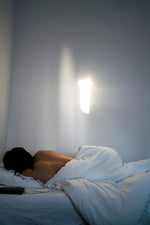
Why Sleep Needs a Rebrand in 2021
Our cultural obsession with caffeine is telling: there's solidarity in sleeplessness. According to Consumer Reports, 164 million Americans struggle with sleep. The CDC says sleep disorders are now so pervasive– and underlie so many other health conditions – that they constitute a public health epidemic.
The research confirms what we’ve intuitively felt for years: we're all tired, and we’re feeling the stress ripple into our work, relationships, and mental health because of it.
How do we exit the cycle of sleeplessness for good?
A passionate, inspired, and happier existence awaits when we sleep deeply. This Sleep Awareness Month we're sharing everything you need to optimize your sleep. Starting with:
SLEEP FACTS
3 generations ago, few people were talking about sleeplessness. Since then, our internal clock has started to fail us. Or rather, modern technology has failed our genetics.
As technology has infiltrated more hours of our day, the circadian rhythms that control our sleep and wake cycles have been disrupted.
Falling asleep in the modern world takes intentionality - but as Arianna Huffington points out, once you feel the benefits - you won’t want to go back. Ready to recalibrate your circadian rhythm? Start with this step-by-step guide from Time.
SLEEP MYTHS
1. Even if you feel well-rested, you likely aren’t.
A UPenn study found published in the New York Times shows even people who believe they’re not affected by sleepiness actually exhibiting dramatic dips in productivity, without realizing it. In fact, after just 2 weeks of 6 hours of sleep a night, you're legally drunk. Find out where your sleep stands with this Sleep Quality Questionnaire.
2. Sleep aids don't work as promised, either.
Studies show prescription sleep aids like Ambien and Lunesta add only 8-20 minutes of additional sleep per night
More and more prescription sleep aids and OTC solutions like Benadryl and Tylenol PM are being linked to long term neural damage, addiction, and rebound insomnia.
MIT scientists found even the lowest dose of melatonin supplement contains 10X more melatonin than what would be naturally produced by the human body and that taking melatonin for sleep leads to higher circulating levels of melatonin throughout the following day that further disrupts users circadian rhythms and created a hangover effect.
3. You can't make up for lost sleep.
Or at least not hour-for-hour. While sleeping in on the weekends may help relieve some of the emotional stress of your Monday all-nighter, the science says you need four days of adequate rest to make up for even one hour of sleep debt. The only way out is through consistent shuteye.
A PLANT- POWERED SOLUTION:
Meet Nightcap – our plant-powered solution to the sleepless epidemic. Taken nightly, Nightcap delivers truly restorative shuteye.

